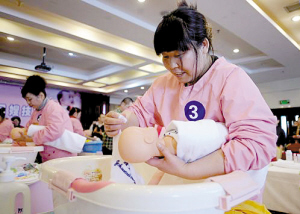

 |
With China’s second-child policy in effect from this January, there is a soaring demand for nursery matrons and infant educators, Guangzhou Daily reported on Wednesday. The wages for such jobs in Dongguan, a city in southern China’s Guangdong province, even saw an average rise of 30 percent.
The business potential also attracted employees of Global 500 enterprises to join the childcare industry, according to information from the talent market in Dongguan.
Thanks to the second-child policy, more families will need babysitters and infant educators. Some anxious mothers even start the nanny hunt months before their newborns arrive.
Huang Yong, director of the Dongguan Chitong Household Service Center, explained that many young couples choose to hire a professional to help out with the new baby since their aging parents cannot take on the strenuous work. Thus, there is great potential in the growing industry.
Data showed that the average pay for nursery matrons is currently around 6,000 yuan per month. Some experienced workers can make up to 8,000 yuan, and for the most seasoned in the industry, even a 10,000 yuan monthly salary is not impossible.
After the second-child policy came into effect, these monthly salaries have increased by about 30 percent on average. Even so, there is still more demand than supply.
In addition, the municipal government of Dongguan offers a subsidy of up to 2,200 yuan for those who undergo infant educator training and pass an examination.
Naturally, the childcare training industry is also riding the baby boom tide, Huang said, adding that in addition to infant educators, some expectant parents also take childcare classes.
Though the salary is tempting, the requirements for the job are rigorous. Apart from patience and a caring attitude, physical health and detail orientation are also a must. One also has to be highly concentrated on the work, given its special nature.
 Charming female soldiers on Xisha Islands
Charming female soldiers on Xisha Islands Beautiful skiers wear shorts in snow
Beautiful skiers wear shorts in snow Getting close to the crew on China's aircraft carrier
Getting close to the crew on China's aircraft carrier A beauty's dancing youth
A beauty's dancing youth "Rent me as your girlfriend!"
"Rent me as your girlfriend!" Chinese stewardess celebrate test flight at Nansha Islands
Chinese stewardess celebrate test flight at Nansha Islands World's first 'underwater skyscraper'
World's first 'underwater skyscraper'  Top 10 weapons in the world in 2015
Top 10 weapons in the world in 2015 Are these the world’s scariest landing strips?
Are these the world’s scariest landing strips? Top 20 hottest women in the world in 2014
Top 20 hottest women in the world in 2014 Top 10 hardest languages to learn
Top 10 hardest languages to learn 10 Chinese female stars with most beautiful faces
10 Chinese female stars with most beautiful faces China’s Top 10 Unique Bridges, Highways and Roads
China’s Top 10 Unique Bridges, Highways and Roads Broadcast trial tests public’s legal awareness
Broadcast trial tests public’s legal awareness A look at the demographics of China’s movie-going population
A look at the demographics of China’s movie-going population Over 70% of young people find ways to watch porn despite crackdown survey
Over 70% of young people find ways to watch porn despite crackdown survey Leftists and rightists battle over how to interpret stories of China’s revolutionary past
Leftists and rightists battle over how to interpret stories of China’s revolutionary pastDay|Week